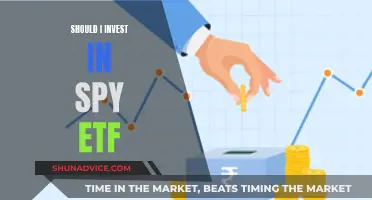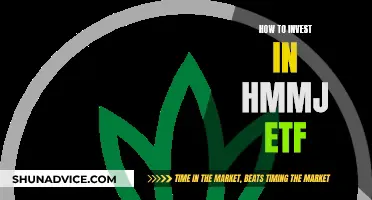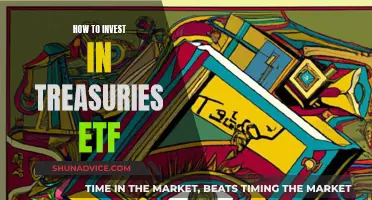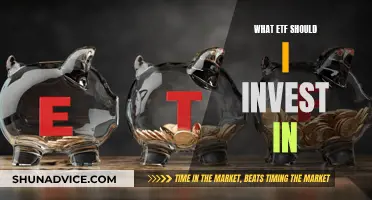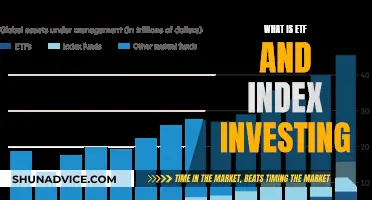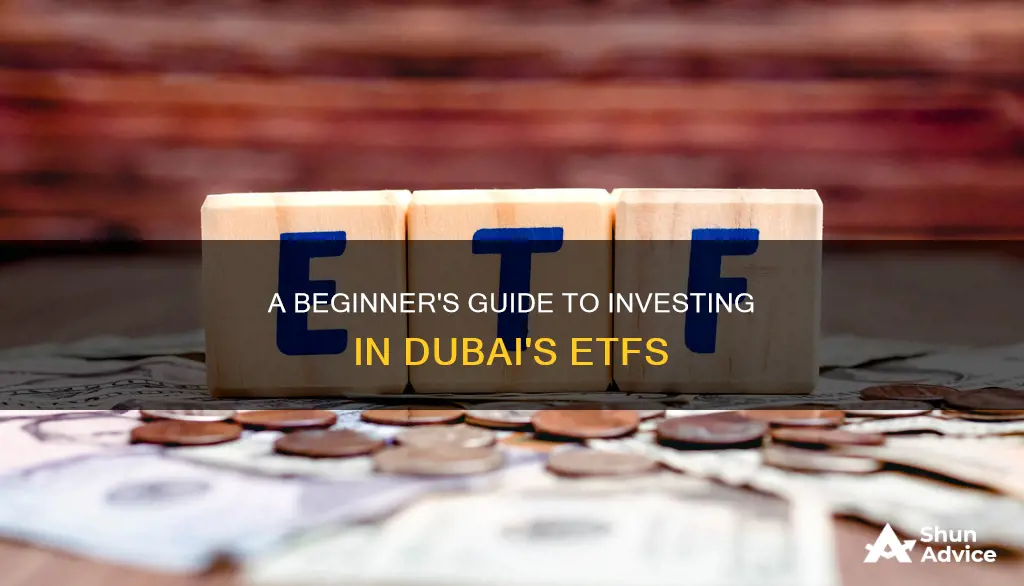
Exchange-traded funds (ETFs) have become increasingly popular in the investment world, attracting over $4 trillion in the last two decades. ETFs are a group of securities that track an underlying index, often containing stocks and bonds. They are traded on a stock exchange and provide investors with diverse exposure to various issuers. ETFs are known for their low fees and charges, making them an attractive alternative to mutual funds. When investing in ETFs, it is important to consider the risks, such as the potential for losses, illiquidity, and exchange rate risks. Dubai-based investors can access ETFs through online brokerage firms or platforms such as HSBC UAE WorldTrader, which offers access to multiple markets and exchanges.
| Characteristics | Values |
|---|---|
| Management fees | Lower than other investment instruments |
| Investment type | Stocks, bonds, precious metals, energy resources, agricultural goods |
| Trading | Bought and sold in the same way as equities |
| Trading hours | During business days and operating hours of the exchange |
| Risk | Lower overall risk due to less volatility |
| Past performance | Not an indicator of future performance |
| Illiquidity | May not be able to sell at the required number of shares |
| Exchange rate | Risk associated with ETFs denominated in a different currency |
What You'll Learn

Understanding Exchange-Traded Funds (ETFs)
Exchange-traded funds (ETFs) have become an increasingly popular investment vehicle, attracting over $4 trillion in the last two decades. ETFs are a group of securities that track an underlying index, such as the S&P 500, and typically contain a basket of investments like stocks and bonds. They are traded on a stock exchange, just like stocks, and provide investors with diverse exposure to various issuers, industries, sectors, markets, and regions.
One of the key advantages of ETFs is their low cost. Management fees and per-unit costs tend to be lower compared to other investment instruments offering similar diversification. For example, investing in ETFs typically involves zero upfront charges, whereas mutual funds can eat up 4-5% of your initial investment. Additionally, ETFs have low annual charges, ranging from 0.07% to 0.50%, compared to actively managed mutual funds, which can charge between 0.75% and 1.95% per year.
ETFs also offer the benefit of diversification, which is a risk management strategy. By investing in a single unit of an ETF, you gain exposure to a wide range of companies or assets, reducing the overall risk of your portfolio as different assets react differently to market conditions.
When investing in ETFs, it's important to remember that past performance is not indicative of future results. The value of investments can go up or down, and there is always the risk of losing money. Additionally, ETFs may be subject to "illiquidity," meaning you may not be able to sell your shares at the desired time or price.
ETFs have liberated investors in the UAE from expensive and inflexible investment plans sold by financial advisors. When choosing an ETF, it's essential to consider your personal circumstances, investment goals, and risk tolerance. Building a balanced portfolio that provides access to different regions, countries, and asset classes is crucial.
Some popular ETF providers include BlackRock iShares, Vanguard, State Street, Invesco, and Charles Schwab, who together account for almost 90% of ETF sales worldwide.
Choosing a Brokerage for ETF Investing: Key Factors
You may want to see also

Choosing an ETF
With over 5,000 ETFs on the market, it can be challenging to decide which one to invest in. Here are some factors to consider when choosing an ETF:
- Investment Objective: Different ETFs have different investment objectives, such as providing exposure to a particular region, country, industry sector, or asset class. Investors should align their investment goals and risk tolerance with the ETF's investment objective. For example, if you want exposure to the United Arab Emirates market, you could consider the iShares MSCI UAE ETF.
- Diversification: ETFs offer built-in diversification by holding a basket of securities. However, the level of diversification can vary across ETFs. Some ETFs may be more specialised and focused on a specific sector or theme, while others may offer broader exposure to multiple regions or asset classes. Consider your existing portfolio and choose an ETF that adds diversification and aligns with your overall investment strategy.
- Performance and Track Record: While past performance does not guarantee future results, it is essential to consider an ETF's historical performance and track record. Look at the ETF's growth over different time periods and compare it with relevant benchmarks or similar ETFs.
- Fees and Expenses: ETFs are known for their low fees, but these can vary across different providers. Consider the expense ratio, management fees, and any other associated costs. Lower fees mean you get to keep more of your gains.
- Liquidity: ETFs are generally liquid, but it is essential to consider the liquidity of the underlying assets. Some ETFs may hold assets that are less liquid, which can impact your ability to buy or sell the ETF easily.
- Provider and Size: Consider the ETF provider's reputation and track record. Larger and more established providers may have a longer history and a wider range of ETFs to choose from. The five largest ETF providers, including BlackRock iShares, Vanguard, and State Street, account for a significant portion of ETF sales worldwide.
- Tax Efficiency: ETFs can have different tax implications, especially when investing in international markets. Understand the tax treatment of any potential capital gains or dividends received from the ETF.
- Risk Profile: Different ETFs have different risk profiles depending on their underlying assets and investment strategies. Consider your risk tolerance and choose an ETF that aligns with your comfort level. Some ETFs may focus on more volatile or aggressive strategies, while others may take a more conservative approach.
- Investment Horizon: Your investment horizon, or how long you plan to hold the ETF, should also be considered. Some ETFs may be more suitable for long-term investing, while others may be designed for shorter-term trades.
- Currency Risk: If you are investing in ETFs denominated in a different currency, be aware of the potential currency risk. Changes in exchange rates can impact your returns.
Remember, it is essential to do your research and understand the specific characteristics of each ETF before investing. Consult a financial adviser if needed to ensure that the ETF aligns with your investment goals and risk tolerance.
Millennials: The ETF Generation?
You may want to see also

ETF Risks
While Exchange-Traded Funds (ETFs) are a popular investment option in Dubai, offering portfolio diversity, flexibility, and low risk, there are some potential risks that investors should be aware of.
Volatility and Price Fluctuations
ETFs can experience rapid price changes, leading to volatility in investment value. This can be a concern, especially for those who are risk-averse.
Liquidity Issues
Some ETFs, particularly those with lower trading volumes, may face challenges when it comes to buying or selling at desired prices quickly. This can impact the ability to exit an investment or realize profits promptly.
Over-diversification Risks
Broad-market ETFs that cover a wide range of assets may include underperforming assets, potentially diluting overall returns. While diversification is generally a strength of ETFs, over-diversification can lead to suboptimal performance.
Performance Tied to Underlying Assets
The performance of an ETF is closely tied to the performance of the underlying stocks, bonds, or commodities it holds. If the underlying assets experience negative returns or poor performance, the ETF's value will be impacted accordingly.
Sector or Industry-Specific Risks
Certain ETFs focus on specific sectors or industries, such as technology or real estate. Investing in these ETFs means being exposed to the risks and fluctuations specific to that sector or industry. For example, an ETF focused on technology stocks will be more vulnerable to disruptions in the tech industry.
Foreign Investment Risks
Some ETFs provide exposure to foreign markets, companies, and currencies. Investing in these ETFs carries additional risks, including political instability, varying regulatory environments, and fluctuations in currency exchange rates.
Management Fees and Trading Costs
While ETFs typically have lower management fees than mutual funds, there are still costs associated with investing in ETFs. These include management fees and trading costs, which can vary depending on the ETF. It's important for investors to review the factsheet of the ETF to understand all associated costs.
AI ETF Investment: Strategies for Success
You may want to see also

Buying and Selling ETFs
An exchange-traded fund (ETF) is a financial instrument that holds a basket of different securities like stocks, bonds, and commodities. ETFs are traded on a stock exchange, much like stocks, and can be bought and sold at any time during trading hours.
When buying and selling ETFs, investors can either do it themselves through a broker or with the help of a financial advisor.
To buy ETFs in the UAE by yourself, you must have an account with a brokerage firm registered with the exchange where you want to trade ETFs. Some of the well-known brokers for investing in ETFs in Dubai include eToro, Sarwa, Saxo Bank, and Interactive Brokers.
If you don't know how to buy and sell ETFs yourself or don't have the time to research and monitor the markets, you can seek the help of a financial advisor. Financial advisors are responsible for staying updated with market trends and potential opportunities. You will explain your goals and risk appetite to them, and they will create and periodically review an ETF portfolio for you.
Advantages of Buying and Selling ETFs
ETFs are a popular choice for investors as they provide exposure to the overall stock market with greater diversification. They are also cost-effective, easy to trade, and provide flexibility in choosing the "theme" or sector in which to invest.
Disadvantages of Buying and Selling ETFs
However, investors should be aware of the potential downsides of ETFs, including rapid price fluctuations, difficulty in buying or selling at appropriate prices (especially for ETFs with lower trading volumes), and the risk of over-diversification, which may lead to diluted returns.
Crude Oil ETFs: How to Invest Wisely
You may want to see also

ETF Platforms in Dubai
Exchange-Traded Funds (ETFs) are a popular choice for investors in Dubai, offering broad diversification and exposure to the overall stock market. ETFs are traded like stocks and offer the advantage of liquidity, allowing investors to buy or sell during trading hours and even purchase on margin. With relatively low management fees, ETFs are more accessible to small investors and provide easier access to alternative investments.
When considering ETF platforms in Dubai, there are several options available. Here are some of the top ETF platforms to consider:
- IShares MSCI UAE ETF: This ETF provides exposure to a broad range of companies in the United Arab Emirates (UAE) and offers targeted access to UAE stocks. It seeks to track the investment results of an index composed of UAE equities. iShares is a well-known provider of ETFs, offering various funds that trade commission-free online through Fidelity.
- CHAE Chimera S&P UAE UCITS ETF: Listed on the Dubai Financial Market (DFM), this ETF provides investors with exposure to UAE equities while also adhering to Shariah principles. It is traded on the exchange and can be purchased through a DFM licensed broker.
- Online Trading Platforms: There are several online trading platforms that offer access to a wide range of ETFs, including popular options such as Interactive Brokers, Saxo Bank, Swissquote Bank, and Internaxx. These platforms provide investors with the tools and resources needed to trade ETFs effectively.
- AES International: AES International is a Dubai-based financial advisory firm that offers low-charging ETFs as one of their investment options. They provide investors with advice and guidance on building a diversified portfolio, including ETFs that match their risk profile.
- CFI: CFI is an online trading platform that offers a wide range of ETF CFDs, including major funds that track indices, sectors, commodities, and more. They provide industry-leading conditions, such as low commission and fast execution, making them a popular choice for ETF traders.
When considering ETF platforms in Dubai, it is essential to research and compare the different options available. Each platform may offer unique features, investment options, and pricing structures, so investors should choose the one that best aligns with their investment goals and strategies.
Investing in Bharat 22 ETF via ICICI Direct
You may want to see also
Frequently asked questions
Exchange-Traded Funds (ETFs) are a group of securities that track an underlying index, such as the S&P 500. They typically contain investments such as stocks and bonds.
ETFs have lower management fees and per-unit costs compared to other investment instruments that offer similar diversification. They are also bought and sold in the same way as equities, making them easily accessible to investors.
As with any investment, past performance is not indicative of future results. ETFs can experience upward or downward movements and there is a chance that they may become valueless. Additionally, there may be exchange rate risks when investing in ETFs denominated in a different currency.
There are various platforms and financial institutions that offer ETF investing in Dubai, such as HSBC UAE WorldTrader, AES International, Interactive Brokers, Saxo Bank, and Swissquote Bank. You can explore these platforms and open an investment account to start investing in ETFs.


